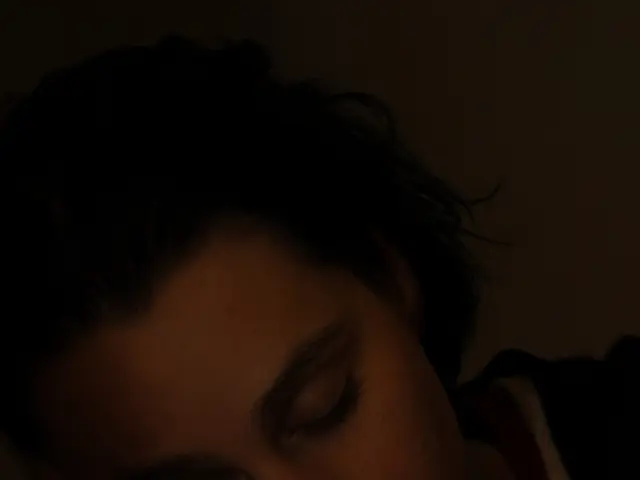Right Side Headache: Source, Significance, and Swift Relief Strategies
Headaches on the right side of your noggin' can be caused by numerous factors, from the common to the more serious. Here's a lowdown on what might be giving you that persistent pain.
Common Cause-and-Effects
- Muscle Tension and Stress: Tight muscles in your neck and scalp, often due to stress, can lead to pain localized to one side of your head. This usually presents as a dull ache or pressure and is one of the most frequent culprits behind one-sided headaches.
- Migraines: Migraines usually manifest as throbbing or pulsating pain on one side of the head, often accompanied by nausea, sensitivity to light and sound, and sometimes visual disturbances called auras. They're known to affect one side, such as the right, and can persist for hours or days.
- Cluster Headaches: These intense, sharp pain episodes usually occur in cyclical patterns, often near one eye or temple, usually on one side of the head. While the exact cause is unclear, it may relate to a hypothalamic dysfunction.
- Cervicogenic Headaches: Rooted in issues in the cervical spine (neck), these headaches start with neck pain that radiates to the head, affecting one side. The pain usually resolves within months of treating the underlying neck problem.
- Sinus Infections (Sinusitis): Sinus inflammation can lead to localized pain on one side of the head, especially around the eyes, cheeks, and forehead, and tends to worsen when bending forward.
- Medication Overuse Headaches (Rebound Headaches): Regular use of painkillers such as acetaminophen, ibuprofen, aspirin, or migraine medications can result in persistent or worsening headaches, sometimes affecting one side.
- Less Common Causes: More serious conditions like stroke, head injury, aneurysms, or giant cell arteritis can also present with one-sided headaches and require prompt medical attention.
On-the-Spot Remedies for Right-Sided Headaches
- Keep it Casual: Maintaining good hydration and eating habits can help keep headaches at bay.
- Zzz's are Key: Aim for at least 7 hours of quality sleep nightly.
- Manage Stress: Relaxation techniques such as meditation, yoga, or deep-breathing exercises can help dissipate tension.
- Steer Clear of Known Triggers: Skip caffeine (or withdrawal), alcohol, aged cheeses, processed meats, MSG, and artificial sweeteners, as they may trigger headaches.
- Physical Therapy: For tension and cervicogenic headaches, gentle neck stretches and physical therapy may alleviate muscle tightness.
- Medication: Over-the-counter pain relievers like acetaminophen or ibuprofen can help manage mild to moderate headache pain. Use these with caution to avoid medication overuse headaches.
- Regular Eye Check-ups: Vision problems can contribute to one-sided headaches, so regular eye exams can help identify and correct underlying issues.
- Track Your Troubles: Keeping a headache diary can help healthcare providers diagnose the cause and tailor treatment to your specific needs.
- Professional Advice: Persistent, severe, or worsening headaches warrant evaluation to rule out serious conditions. Don't hesitate to seek professional help if needed.
- Qulipta, a treatment for cluster headaches, may provide relief for those experiencing intense, sharp pain episodes.
- Personas with migraines might find therapies and treatments like triptans, CGRP inhibitors, and certain lifestyle modifications helpful.
- If you're a person experiencing stress-related muscle tension, relaxation techniques like meditation, yoga, and deep-breathing exercises can help dissipate tension and alleviate right-sided headaches.
- Established medication overuse headaches can be managed by avoiding regular use of painkillers such as acetaminophen, ibuprofen, aspirin, or migraine medications.
- For individuals with chronic diseases like cancer, neurological disorders, or autoimmune disorders, managing their medical conditions can help reduce the risk of developing right-sided headaches.
- If you have respiratory conditions, digestive health, eye health, hearing, or skin conditions, maintaining good health and wellness through proper care and treatments is essential for headache management.
- Fitness and exercise, as a part of a comprehensive workplace-wellness program, can improve overall health, potentially reducing the risk of right-sided headaches.
- For persons seeking better sexual health, understanding and managing underlying sexual health issues could help prevent or alleviate right-sided headaches.
- Aging can exacerbate the risk of various medical conditions, including right-sided headaches, making it essential for older adults to prioritize regular medical check-ups and health screenings.
- Women's health issues, such as hormonal imbalances, pregnancy, menopause, or miscarriage, can sometimes lead to headaches; therefore, open communication with healthcare providers and proper care is vital.
- Parenting, a demanding responsibility, can increase stress and lead to muscle tension and headaches; effective stress management and self-care practices can help alleviate these symptoms.
- Weight management, a crucial aspect of overall health and wellness, can help reduce the risk of developing right-sided headaches due to factors such as obesity and sleep apnea.
- Maintaining cardiovascular health through diet, exercise, and regular medical check-ups is essential for preventing various medical conditions, including right-sided headaches.
- Neurological disorders, such as fibromyalgia, multiple sclerosis, or Parkinson's disease, can cause headaches; proper management and treatment of these conditions can help alleviate symptoms.
- Sports activities can sometimes cause headaches due to injury, dehydration, or increased stress levels; proper warm-up, hydration, and cool-down routines can help mitigate these risks.
- Sports betting, a form of gambling, can lead to stress and subsequent headaches; it's essential to set limits, seek support, and take breaks when needed.
- Skin conditions like acne, rosacea, or psoriasis can sometimes cause headaches; proper skincare, including maintaining a healthy diet and using appropriate skincare products, can help alleviate these symptoms.
- Mental health conditions like depression, anxiety, or bipolar disorder can sometimes present with headaches; proper diagnosis, treatment, and mental health management are essential for holistic health and wellness.
- Mens' health issues, ranging from prostate conditions to mental health issues, can sometimes lead to headaches; open communication with healthcare providers, self-care practices, and regular health screenings can help manage these issues effectively.








